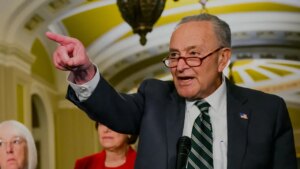The Senate has officially confirmed President Donald Trump’s choice to lead the Centers for Disease Control and Prevention. Susan Monarez, a seasoned Washington figure with a background in various government public health roles, secured the Senate’s approval on Tuesday. The confirmation marks another successful step in the increasingly growing list of nominees awaiting confirmation.
Monarez, who holds a Ph.D. in microbiology and immunology, has an extensive career in D.C. She has previously held positions such as deputy director of the Advanced Research Projects Agency for Health within the Department of Health and Human Services, as well as roles at the White House including the Office of Science and Technology Policy and the National Security Council.
This confirmation process for Monarez is historic as she is the first CDC director to undergo Senate confirmation following a change in the requirement in 2023. Prior to her confirmation, Monarez had been serving as the acting director of the CDC since the beginning of the year.
President Trump initially nominated Dr. David Weldon to lead the CDC but later withdrew the nomination due to a lack of support from Senate Republicans. Trump praised Monarez’s qualifications and expressed a commitment to restoring confidence in the CDC.
During her confirmation hearing, Senate Democrats questioned Monarez about her alignment with Health and Human Services Secretary Robert F. Kennedy Jr.’s views on vaccines. Kennedy has been vocal about his skepticism regarding vaccines, particularly COVID-19 vaccines.
Despite some concerns, Kennedy publicly endorsed Monarez for the position, emphasizing her expertise and dedication to public health. The confirmation also comes as Kennedy proposes significant budget cuts to the CDC in the upcoming fiscal year.
Overall, the confirmation of Susan Monarez as the CDC director signifies a new chapter for the agency under her leadership. The collaboration between Monarez and Secretary Kennedy is anticipated to prioritize accountability, high standards, and disease prevention to address public health challenges effectively.





